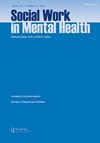Client characteristics and service utilization with emergency department peer recovery specialists in a statewide opioid overdose prevention intervention
IF 0.9
Q3 SOCIAL WORK
引用次数: 0
Abstract
ABSTRACT Opioid peer recovery service programs are important interventions to increase treatment engagement, adherence, and completion among clients. Little research has examined emergency department (ED) peer recovery programs, the utilization of these services, and patient characteristics. This study examined client data (N = 1690; Mean age = 36.05 ± 12.04) from New Jersey’s Opioid Overdose Recovery Program (OORP). Between group analyses examined differences between repeated OORP service utilization and those new to OORP services on patient characteristics, primary substance of use, and mental health diagnosis. Exploratory logistic regression analyses were conducted to examine clinically relevant variables as predictors of repeated OORP service utilization. Sociodemographic differences were observed among those with repeated OORP service utilization, including a higher number of prior overdoses (3.87 ± 4.78) and a greater proportion to use heroin (93.34%). Multivariate logistic regression analyses showed several clinically important indicators associated with repeated OORP service utilization. Findings showed that several notable sociodemographic and clinical indicators associated with multiple OORP service utilization that can help support future prevention and clinic-intervention programs. These findings provide important information on participants at high risk for fatal overdose, and considerations for measured intervention services.全州阿片类药物过量预防干预中急诊部门同伴康复专家的客户特征和服务利用
阿片类药物同伴康复服务项目是提高客户治疗参与度、依从性和完成度的重要干预措施。很少有研究检查急诊科(ED)同伴康复计划,这些服务的利用,和病人的特点。本研究检查了客户资料(N = 1690;平均年龄= 36.05±12.04),来自新泽西州阿片类药物过量恢复计划(OORP)。组间分析检查了重复使用OORP服务和新使用OORP服务的患者在患者特征、主要使用物质和心理健康诊断方面的差异。进行探索性逻辑回归分析,以检验临床相关变量作为重复使用OORP服务的预测因素。在重复使用OORP服务的人群中,观察到社会人口学差异,包括先前过量使用的人数(3.87±4.78)和使用海洛因的比例(93.34%)更高。多因素logistic回归分析显示,多个临床重要指标与重复使用OORP服务相关。研究结果显示,与多个OORP服务利用率相关的几个显著的社会人口统计学和临床指标可以帮助支持未来的预防和临床干预计划。这些发现提供了致命过量高风险参与者的重要信息,以及衡量干预服务的考虑因素。
本文章由计算机程序翻译,如有差异,请以英文原文为准。
求助全文
约1分钟内获得全文
求助全文
来源期刊

Social Work in Mental Health
SOCIAL WORK-
CiteScore
1.90
自引率
0.00%
发文量
34
期刊介绍:
Social Work in Mental Health is an exciting contribution from the editors of our highly respected journal, Social Work in Health Care. This journal offers quality articles on clinical practice, education, research, collaborative relationships, mental health policy, and the delivery of mental health care services. This scholarly, creative, and lively journal presents material valuable to social workers in all sectors of mental health care. It is devoted to social work theory, practice, and administration in a wide variety of mental health care settings. Social Work in Mental Health will help you improve your practice in these areas, demonstrating the vital role of social services in mental health care delivery systems.
 求助内容:
求助内容: 应助结果提醒方式:
应助结果提醒方式:


